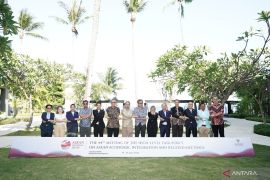According to a new study titled "ASEAN Community 2015: Managing Integration for Better Jobs and Shared Prosperity" that was launched by ILO and Asian Development Bank (ADB) in Jakarta on Wednesday, the introduction of AEC in 2015 can generate 14 million additional jobs and improve the livelihood of 600 million people living in the region.
The ILO Assistant Director General and Regional Director for Asia and Pacific Yoshiteru Uramoto remarked that the member states will be able to garner the benefits only if decisive action is taken to manage it effectively, such as developing policies and institutions that will support inclusive and fair development.
"Ultimately, ASEANs plan for greater regional integration will be judged on how much it benefits ordinary working men and women in the region," Uramoto noted.
To counter development inequality, there is an urgent need to improve the quality, coverage, and sustainability of social protection, starting with the establishment of a social protection floor for all.
Thus far, ILO has recognized the Indonesian Governments policy of national insurance scheme to guarantee social protection for all people, which was managed by the Social Security Management Agency.
Other priority areas identified in the report include more decisive management of structural changes, improved alignment of different sectoral and national policies, strengthening of regional cooperation and implementation of existing commitments, stronger labor market institutions, including wage-setting, to support inclusive prosperity and growth, support for small enterprises, more effective skills recognition systems, and closer links between education and the labor market.
"Policy makers must not miss this opportunity to ensure that the benefits of the regions impressive development are enjoyed by all," Uramoto emphasized.
ILO and ADB also reported that under the AEC, the demand for highly skilled workers will also increase, and by 2015, high-skill jobs are projected to grow 41 percent or 14 million jobs will be available for the people in member states.
However, the report predicts that skill shortages and mismatches are likely to worsen due to inadequate availability and quality of education and training.
According to ADB Director of Regional Economic Integration Arjun Goswami, the ASEAN state members should consider developing closer links between education and the labor market in order to improve the number of skilled workers.
"Investment in labor productivity is critically important for the sustained development of ASEAN," Goswami stated.
According to the Central Statistics Agency, as of August 2013, the workforce in Indonesia was 118.19 million people, out of which 7.39 million were unemployed.
(T.A060/INE/O001)
EDITED BY INE
(T.A060/A/KR-BSR/O001)
Editor: Aditia Maruli Radja
Copyright © ANTARA 2014











